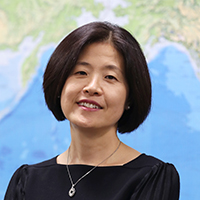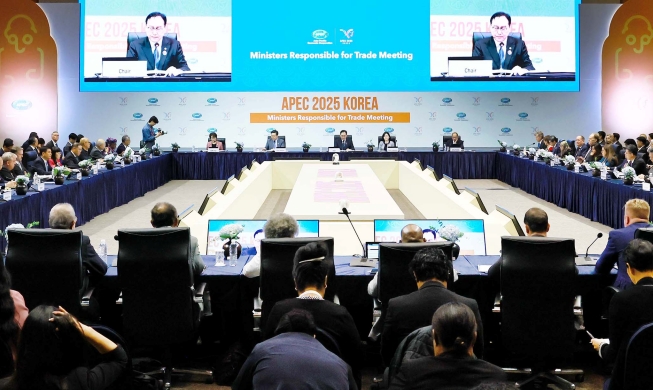
By Kim Yanghee
Professor at Korea National Diplomatic Academy
The Japanese Ministry of Economy, Trade and Industry on July 4 decided to toughen conditions for the export to Korea of three key materials for producing semiconductor and display products -- photoresist, hydrogen fluoride and fluorine polyimide. On Aug. 28, the ministry also removed Korea from its list of white countries preferential trading partners. Since then, these measures have served as a catalyst complicating the complex bilateral conflict to an unprecedented level and causing interlapping issues in diplomacy, economy and security.
Japan took such measures to hamper the implementation of the verdict by the Korean Supreme Court finding in favor of Korean victims of forced labor under Japanese colonial rule. Many channels have confirmed this such as the Japanese daily Mainichi Shimbum in a Sept. 4 article and The Asahi Shimbun in a story run on Oct. 18. Behind Tokyo's decision to take these actions, however, are the Abe administration's accumulated distrust of Korea in diplomacy and security and deep-rooted anti-Korean sentiment by Japan's history revisionists. Complicated political and economic contexts also swayed Japan's decision to impose export restrictions targeting semiconductors among all warning measures it reviewed for the same purpose.
American political scientists Henry Farrell and Abraham Newman warned of "weaponized interdependence" in their co-written paper released this year titled "Weaponized Interdependence: How Global Economic Networks Shape Coercion and Surveillance." They presented their concept in economic relations among countries that show an asymmetric network structure like that of a wheel's hub and spokes in today's world, where the close network between technology and security is growingly complex. As such, the phenomenon in which the hub limits a spoke's high-end technology transactions is called weaponized interdependence. A leading example is heightened U.S. vigilance over China's Huawei in 5G technology. In the op-ed "Japan and South Korea Are Being Pulled into a Low Level Economic War" published by The Washington Post on Aug. 1, Farrell and Newman also called Japan's export restrictions an example of weaponized interdependence, or retaliation against the ruling by Korea's top court on the forced labor victims. Japan aims to pressure Korea by weaponizing the supply of materials needed to produce semiconductors, or strategic materials of Japan's dual use that Korea has been highly dependent on.
About four months after Japan imposed the restrictions on the export of the three semiconductor materials to Korea, the Japanese government in mid-November restored the export approval of the three among nine items including liquefied hydrogen fluoride. Thus the worst-case scenario that spurred fears right after Japan implemented the measures did not occur.
Does this mean Korea overreacted to Japan's export restrictions and that the situation has stabilized?
The answer is no. The reason Japan restored its approval of the export of the three items is because it achieved its goals, namely exposing the vulnerability of Korean industries dependent on Japanese technology and grabbing global attention to reparations for the forced labor victims.
Japan, however, apparently tried to make up for the backlash shown by Korea, which displayed stronger-than-expected opposition. This painful and unintended result could lead to the decoupling of the two economies and Japan to lose international trust. The decoupling can be described as the "de-Japanization" of the Korean economy and "de-Koreanization" of the Japanese economy, with the former being the main driving force at the moment. This has given Korean companies that had been dependent on Japanese exports no choice but to de-Japanize themselves. This phenomenon could damage the competitiveness of related Japanese industries over the long term. Accordingly, the Japanese government can be interpreted to have hesitated strengthening the export restrictions because of its need to lower the possibility that Japanese companies could also join the de-Japanization trend. Other possible reasons include the symmetric inter-relations between Korea and Japan in the global value chain (GVC), the threat of Tokyo's bid to control export management to confuse not only Japan's supply chain but also that of the world IT industry, and the possibility that this could give China an advantage. Japan might also need to claim that it did not violate international regulations to defend itself against Seoul's petition filed against Tokyo with the World Trade Organization.
Japan's export restrictions mark a crucial turning point in the economic history between the two nations because such sanctions destroyed mutual trust, the foundation of global commerce. Once Seoul learned the lesson that Tokyo could launch a critical attack at any time, Korea had no choice but to pursue de-Japanization from a long-term perspective. This is the rational choice for Korea amid the changed environment.
According to a World Bank report in 2017, when the GVC participation rate increases 10%, its productivity rises 1.7%. The reorganization of the GVC due to artificial factors such as de-Japanization must correspond with the flow of future socioeconomic and technological shifts along with parallel efforts to boost productivity. De-Japanization also requires transparency, fairness, compliance with international regulations, harmonization with employment and the environment.
Korea and Japan must form a new relationship that reflects the power transition between the two. Japan predicted that Korea would give up if Tokyo gave a warning to Seoul, but this was a miscalculation because of the power shift. Korea's nationwide boycott of Japanese products and the significant reduction of Korean tourists visiting Japan are solid proof of Korea's strengthened purchasing power and the latter's blow to the Japanese economy to a degree.
Still, Korea and Japan should not forget that they are valuable neighbors who share the value of market economics and democracy within the region. With Japan being the world's third-largest economy and Korea the 12th largest, both sides can conduct win-win cooperation based on their mutual strengths. Recent examples of such collaboration include the planned strategic merger between Japan's Softbank and Line of Korea's web portal Naver and more than 100 economic cooperation projects between both countries in developing countries. Both countries need collaboration in diplomacy and security to jointly respond to issues of mutual interest, including the deepening strategic conflict between the U.S. and China, China's meteoric rise and completion of the Korean Peninsula peace process.
Through "weaponized interdependence" utilized by the U.S., Japan has been hit by the boomerang of de-Japanization in Korea and the world. This has incurred global distrust of Japan and the erosion of its soft power. Japan must now retract its export restrictions and strive to recover the international community's trust by declaring its commitment to observe the principle of separation of politics and economy.
Kim is director-general of the Department of International Economy and Trade Studies at the Korea National Diplomatic Academy. Her areas of interest for research include international economics, regional integration, Korea-Japan economic relations and the Japanese economy.
Translated by Korea.net staff writer Yoon Sojung.
